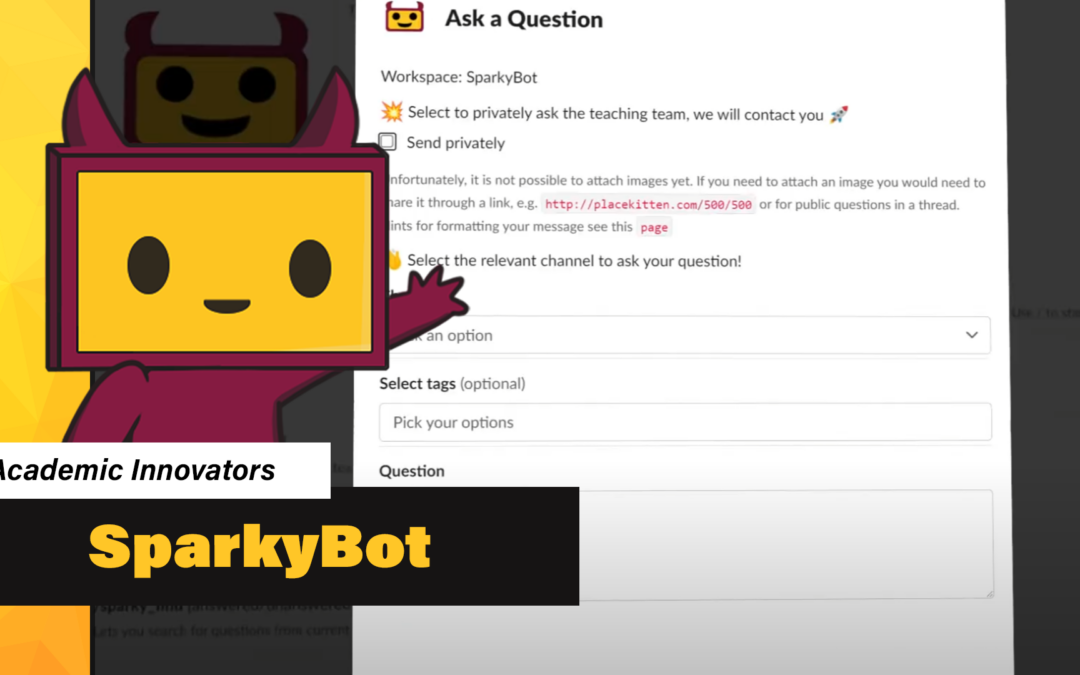Alexandra Mehlhase is a Software Engineering faculty member at the Polytechnic Campus who has created a Slackbot, called SparkyBot, to create more engaging, organized discussions in Slack. Mehlhase feels that “there is a hurdle to write a question” in formal discussion forums. She believes that Slack facilitates better student engagement by removing fear. Students may be afraid of not being taken seriously or are worried about asking “obvious” questions.
“As a teacher, I want to be able to answer questions as fast as possible for my students,” Mehlhase says. In her engineering courses, her students have to set up Gradle, specific Java versions, an EC2 instance on Amazon Web Services (AWS) and debug much of their code for their assignments. This leads to numerous questions posted every day. This engagement in Slack can make the threads cluttered and can make it difficult for students to navigate to find answers. Students derive tremendous benefit from timely, formative feedback and she wanted a way to better organize and highlight questions in the fast-paced Slack environment.
With the help of Mehlhase’s SparkyBot, students’ questions are color coded and channels are created to aid in the organization of the workspace. This allows her workspace and channel set up with the bot to take only seconds. When students ask a question, it is highlighted in red. When an instructor answers, it is highlighted in orange. And once a student feels that their question is answered, they confirm with a simple click on their end and the color changes to green. This allows for a birds-eye view of the questions in the channel.
SparkyBot also has a private question feature. Mehlhase explains, “It allows students to ask private questions to the whole teaching team, creating a question ticket that goes to me and my UGTAs.” This ticket can then be claimed by someone on the teaching team to ensure efficiency. “And it’s more likely for them to get an answer fast.” This same ticketing workflow is now used for grade appeals in Mehlhase’s courses as well. Mehlhase and her instructional team are also able to see how long it takes to answer a question. There are several gamified elements to SparkyBot too – including a leaderboard and ‘cookie’ rewards system for when students give good answers to their classmates’ questions.
This project has been in development for over two years. Mehlhase created the first rough prototype and then worked with an engineering capstone group for two semesters to further develop. “With each iteration and every time I asked for feedback, I got new ideas.”
Mehlhase said that she sees future integrations with artificial intelligence to SparkyBot to enable features like tags and a frequently asked questions channel – both features that she had tried in the past, but discontinued due to the manual labor required to keep them up to date. Mehlhase feels that the success of the SparkyBot is made evident by the number of answered questions and her teaching team’s average answer time. Mehlhase also shared, “Feedback from students in general is that Slack gives them an in-class feeling because they can discuss with each other and the instructor live… ‘Hallway conversations’ happen a lot more.”
This process encourages students to focus their questions and gauge their own level of mastery on the given topics. The ongoing formative feedback in SparkyBot promotes refinement of conceptual understanding as students incorporate new information (from the instructor, UGTAs, and their peers) to improve their comprehension. It also provides instructors and UGTAs with real-time feedback on student misconceptions and ‘muddy points’ throughout the learning process. This is helpful for the current group of students and also provides the teaching team with valuable feedback on what can be improved for the next time the course is offered.
Ed Discussion is another learning technology option for faculty looking for robust and scalable communication tools for their course. Learn more here.
This article and video are part of a new faculty spotlight series, Academic Innovators, that provides recognition and insight for the inspirational work and research being done in the FSE community. Please consider nominating a faculty member (yourself, included!) to be featured.
